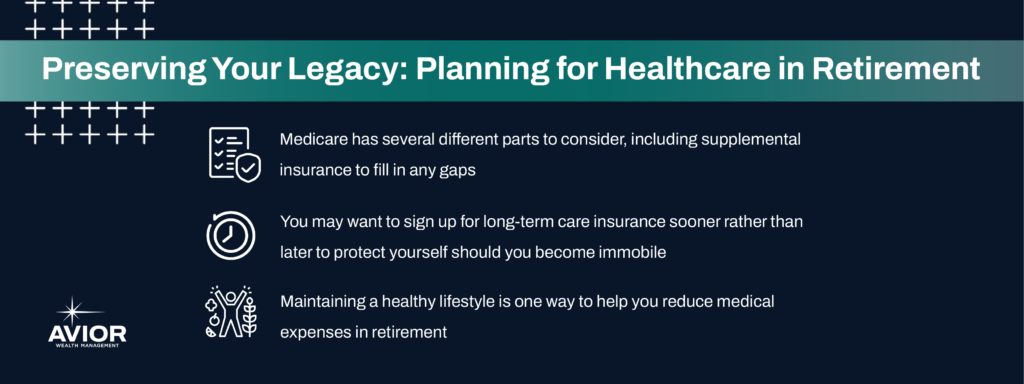Preserving Your Legacy: Planning for Healthcare in Retirement
Your healthcare needs are a key component of your overall retirement planning goals.

Navigating retirement planning is already a challenge. Factoring in unexpected costs like medical expenses can add a complicated layer. With the rising costs of healthcare, trying to predict your healthcare needs, and considering your lifestyle requirements, it’s not always straightforward what you should be focusing on.
To assist, we’re offering these practical strategies and tips that will help you stay proactive in healthcare planning to ensure a worry-free retirement.
Understanding Medicare and supplemental insurance
It’s important to learn how the Medicare system works and the coverages you will choose from in retirement. Here are the basics of Medicare coverage:
- Medicare Part A: Hospital insurance
- Medicare Part B: Medical insurance
- Medicare Part C: Medicare Advantage, a private company offering approved by Medicare
- Medicare Part D: Drug coverage
What is known as “Original Medicare” includes Parts A and B as standard coverage, typically along with Part D. Medicare Advantage (Part C) is an alternative to Original Medicare and it could provide lower out-of-pocket costs and additional benefits like dental and vision insurance, according to Medicare.gov.
With Original Medicare, you’ll still be on the hook for a few costs when getting medical services. Many people decide to get Medicare supplemental insurance, also known as Medigap, to get extra help covering those costs.
You purchase Medigap from a private provider, and available plans depend on the state you live in. You want to select a plan that provides the right balance of extra coverage with minimal added monthly costs.
The right approach to Medicare looks different for everyone, based on your unique goals, financial situation, and health status. Review your options and the pros and cons as you’re planning for retirement.
Considering long-term care insurance
Long-term care insurance may also be a reality for you, but not everyone needs it or plans for it. Long-term care isn’t covered by regular insurance and may be required if you become unable to perform activities of daily living (ADLs) on your own, including these six tasks: getting dressed, bathing, transferring, dealing with incontinence, toileting, or eating.
An injury or illness could lead to long-term care needs. If you have long-term care insurance, you usually become eligible to receive benefits when you can no longer perform two out of the six ADLs.
Different types of long-term care exist, including care at home or care in an assisted living facility or nursing home. While some long-term care is provided for a long time, like the rest of someone’s life, sometimes it’s only needed temporarily.
Scenarios where long-term care insurance could be beneficial include these examples:
- Falling and breaking a hip
- An Alzheimer’s Disease diagnosis
- A terminal illness diagnosis
- A chronic medical condition or disability
The important thing to know about long-term care insurance is that you can’t buy coverage when you begin to need it. That means you have to plan for it early, as you don’t qualify if you already have an incapacitating condition. Insurance carriers often won’t approve people who apply if they’re over 75.
Consider the fact that without long-term care insurance, in the event you need it later in life, you’ll have to take out those costs from whatever money you have saved for retirement.
Budgeting for out-of-pocket healthcare costs
Part of successful retirement planning is estimating and budgeting for potential out-of-pocket healthcare expenses. This may take assessing current health conditions, family medical history, and lifestyle factors to anticipate potential health needs.
Creating a healthcare savings plan is a key component. Health savings accounts (HSAs) can be valuable tools, offering tax advantages like allowing pre-tax contributions and withdrawing funds tax-free for qualified medical expenses. Maximizing contributions to an HSA while still employed now can help you build a substantial fund for healthcare costs in retirement. Additionally, if eligible, contributing catch-up contributions (available to those aged 55 and older) can further boost savings.
Regularly reviewing and updating your budget to reflect changes in health, healthcare costs, and insurance premiums will also ensure that the plan remains aligned with your evolving needs in retirement. A well-thought-out budget alongside strategic savings in vehicles like HSAs can provide a financial safety net for healthcare expenses.
Consulting with a financial advisor will help you get a better understanding of potential costs and develop a realistic budget.
Maintaining a healthy lifestyle in retirement
Of course, one of the best ways to reduce healthcare costs in retirement is to focus on living a healthy lifestyle. You can’t control everything about your health, but taking the right steps now and when you retire can help you limit your healthcare needs over time. Here are a few tips:
- Exercise regularly: Incorporate regular physical activity into your routine. This could include walking, swimming, yoga, or any form of exercise that you enjoy. Aim for at least 150 minutes of moderate-intensity exercise per week, as recommended by health experts.
- Develop healthy eating habits: Adopt a balanced and nutritious diet. Emphasize fruits, vegetables, whole grains, and lean proteins while limiting processed foods, saturated fats, and excessive sugar intake. Staying hydrated is also essential for overall health.
- Engage socially: Stay socially active by connecting with friends, family, and community groups. Social engagement can contribute to mental and emotional well-being, reducing the risk of isolation and depression.
- Stimulate the mind: Keep your mind active through activities that stimulate cognitive function. This could include reading, doing puzzles, learning a new skill, or participating in educational programs. Stay curious and engaged in lifelong learning.
- Get regular check-ups: Schedule regular check-ups with healthcare professionals to monitor and address any health concerns. Early detection and management of health issues can significantly improve outcomes. Stay up-to-date on preventive health measures, such as vaccinations and screenings.
- Prioritize sleep: Ensure you get sufficient, quality sleep. Establish a consistent sleep routine and create a comfortable sleep environment. Quality sleep is crucial for physical and mental health.
Focusing on your health and prioritizing an active, healthy lifestyle is key to cutting down on medical expenses in retirement.
Estate planning and healthcare directives
Another important component of retirement healthcare planning is establishing advance healthcare directives in your estate plan. Healthcare directives allow you to assign responsibility to someone you trust to make medical decisions on your behalf should you become incapacitated.
Your healthcare wishes and directives can be a key component of your estate plan, established in documents like a living will, power of attorney, medical power of attorney, do not resuscitate order, or other legal agreements that outline your preferences.
Securing your health and legacy in retirement
A crucial aspect of retirement planning is healthcare. You never know what will happen with your health, so being prepared will help you protect your savings and get the care you need.
To discuss retirement planning and legacy preservation with a professional, contact the team at Avior. Avior advisors can help you align your goals with the right financial practices.
Disclaimer: Nothing contained herein should be construed as legal or tax advice. Avior and our Advisors will work with your attorney and/or tax professional to assist with your legal and tax strategies. Please consult your attorney or tax professional with specific legal and/or tax questions. Investment Management and Financial Planner are offered through Avior Wealth Management, LLC, an SEC-registered investment advisor. Past performance is not a guarantee of future results. Investments are subject to loss, including the loss of principal.
No Comments
Sorry, the comment form is closed at this time.




